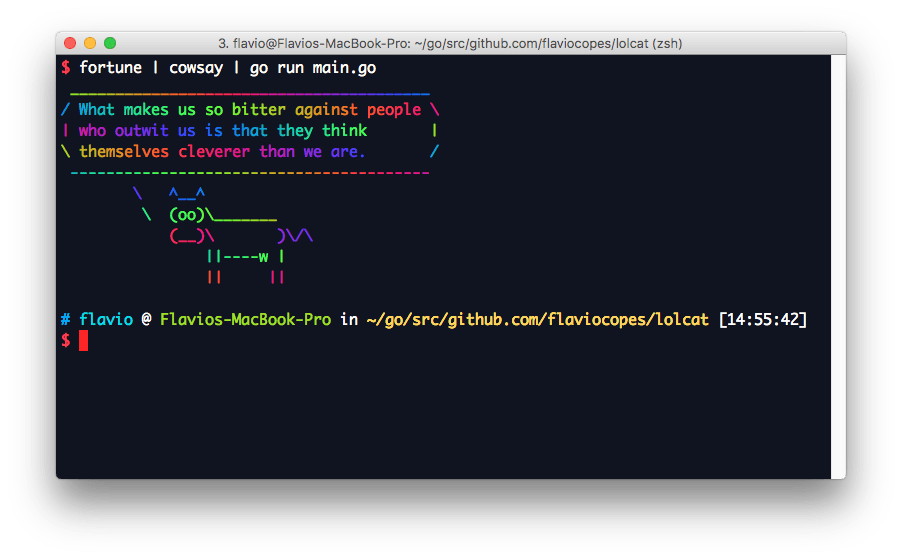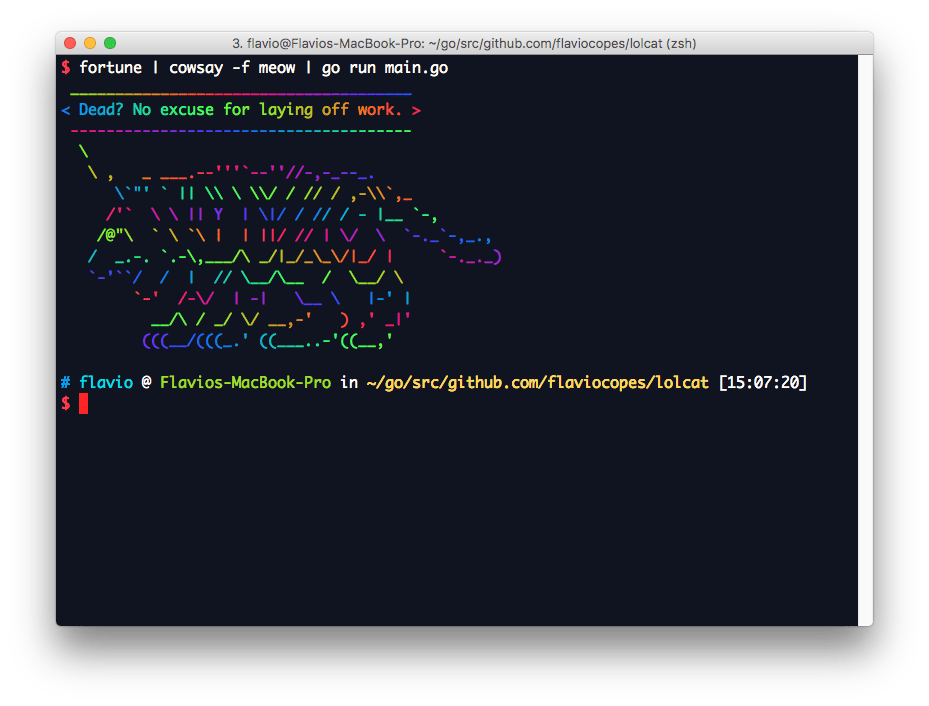Build a Command Line app with Go: lolcat
Like CLI apps? Don’t miss the cowsay tutorial as well!
I was looking for some terminal applications for inspiration and I stumbled on lolcat.
The original is https://github.com/busyloop/lolcat and there are quite a few Go implementations already:
- https://github.com/cezarsa/glolcat
- https://github.com/latotty/lolcat
- https://github.com/lalyos/lolcat
- https://github.com/vbatts/gogololcat
Looks like a completely useless thing to build, so let’s do it!
Let’s start by printing some values on the screen, then we’ll move to coloring them, and then we’ll look into accepting user input to work as a pipe.
I use https://github.com/enodata/faker to generate fake output.
go get -u github.com/enodata/fakerThis program outputs a number of phrases:
package main
import (
"fmt"
"strings"
"github.com/enodata/faker"
)
func main() {
var phrases []string
for i := 1; i < 3; i++ {
phrases = append(phrases, faker.Hacker().Phrases()...)
}
fmt.Println(strings.Join(phrases[:], "; "))
}
Unfortunately, this is all boring B/W. Let’s add some color. We can do this by prepending an escape character sequence in fmt.Printf. This prints all the strings in the gold color #FFD700, whose RGB color code is (255,215,0):
package main
import (
"fmt"
"strings"
"github.com/enodata/faker"
)
func main() {
var phrases []string
for i := 1; i < 3; i++ {
phrases = append(phrases, faker.Hacker().Phrases()...)
}
output := strings.Join(phrases[:], "; ")
r, g, b := 255, 215, 0 //gold color
for j := 0; j < len(output); j++ {
fmt.Printf("\033[38;2;%d;%d;%dm%c\033[0m", r, g, b, output[j])
}
}
Now that we have a string, and the groundwork for making each character colored in a different way, it’s time to introduce the rainbow.
package main
import (
"fmt"
"math"
"strings"
"github.com/enodata/faker"
)
func rgb(i int) (int, int, int) {
var f = 0.1
return int(math.Sin(f*float64(i)+0)*127 + 128),
int(math.Sin(f*float64(i)+2*math.Pi/3)*127 + 128),
int(math.Sin(f*float64(i)+4*math.Pi/3)*127 + 128)
}
func main() {
var phrases []string
for i := 1; i < 3; i++ {
phrases = append(phrases, faker.Hacker().Phrases()...)
}
output := strings.Join(phrases[:], "; ")
for j := 0; j < len(output); j++ {
r, g, b := rgb(j)
fmt.Printf("\033[38;2;%d;%d;%dm%c\033[0m", r, g, b, output[j])
}
fmt.Println()
}
That’s style!
The rainbow color is generated using the rgb() function, as implemented in the original Ruby source code in https://github.com/busyloop/lolcat/blob/master/lib/lolcat/lol.rb
Let’s now edit the program and instead of providing its own output, let it work as a pipe for other programs. It will read the content from os.Stdin and rainbowize it.
package main
import (
"bufio"
"fmt"
"io"
"math"
"os"
)
func rgb(i int) (int, int, int) {
var f = 0.1
return int(math.Sin(f*float64(i)+0)*127 + 128),
int(math.Sin(f*float64(i)+2*math.Pi/3)*127 + 128),
int(math.Sin(f*float64(i)+4*math.Pi/3)*127 + 128)
}
func print(output []rune) {
for j := 0; j < len(output); j++ {
r, g, b := rgb(j)
fmt.Printf("\033[38;2;%d;%d;%dm%c\033[0m", r, g, b, output[j])
}
fmt.Println()
}
func main() {
info, _ := os.Stdin.Stat()
var output []rune
if info.Mode()&os.ModeCharDevice != 0 {
fmt.Println("The command is intended to work with pipes.")
fmt.Println("Usage: fortune | gorainbow")
}
reader := bufio.NewReader(os.Stdin)
for {
input, _, err := reader.ReadRune()
if err != nil && err == io.EOF {
break
}
output = append(output, input)
}
print(output)
}
It reads one rune at a time from os.Stdin and adds it to the output slice of runes.
The output rendering has been extracted to print(), but we could also pipe “just in time” each rune as it’s scanned:
package main
import (
"bufio"
"fmt"
"io"
"math"
"os"
)
func rgb(i int) (int, int, int) {
var f = 0.1
return int(math.Sin(f*float64(i)+0)*127 + 128),
int(math.Sin(f*float64(i)+2*math.Pi/3)*127 + 128),
int(math.Sin(f*float64(i)+4*math.Pi/3)*127 + 128)
}
func main() {
info, _ := os.Stdin.Stat()
if info.Mode()&os.ModeCharDevice != 0 {
fmt.Println("The command is intended to work with pipes.")
fmt.Println("Usage: fortune | gorainbow")
}
reader := bufio.NewReader(os.Stdin)
j := 0
for {
input, _, err := reader.ReadRune()
if err != nil && err == io.EOF {
break
}
r, g, b := rgb(j)
fmt.Printf("\033[38;2;%d;%d;%dm%c\033[0m", r, g, b, input)
j++
}
}This works same as before.
We can now entertain ourselves with fortune and cowsay


Let’s make this a system-wide command by running go build and go install. The command will be run as gololcat, since we used that as the folder name.

download all my books for free
- javascript handbook
- typescript handbook
- css handbook
- node.js handbook
- astro handbook
- html handbook
- next.js pages router handbook
- alpine.js handbook
- htmx handbook
- react handbook
- sql handbook
- git cheat sheet
- laravel handbook
- express handbook
- swift handbook
- go handbook
- php handbook
- python handbook
- cli handbook
- c handbook
subscribe to my newsletter to get them
Terms: by subscribing to the newsletter you agree the following terms and conditions and privacy policy. The aim of the newsletter is to keep you up to date about new tutorials, new book releases or courses organized by Flavio. If you wish to unsubscribe from the newsletter, you can click the unsubscribe link that's present at the bottom of each email, anytime. I will not communicate/spread/publish or otherwise give away your address. Your email address is the only personal information collected, and it's only collected for the primary purpose of keeping you informed through the newsletter. It's stored in a secure server based in the EU. You can contact Flavio by emailing flavio@flaviocopes.com. These terms and conditions are governed by the laws in force in Italy and you unconditionally submit to the jurisdiction of the courts of Italy.